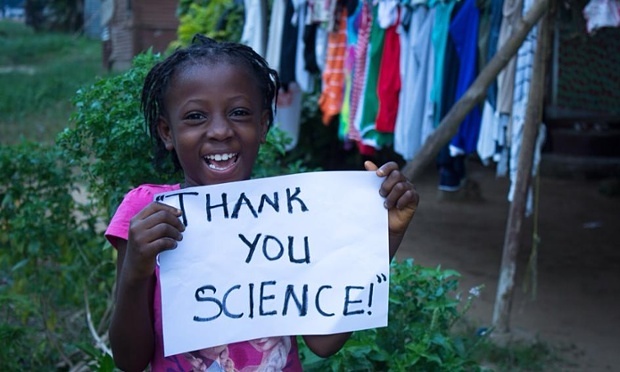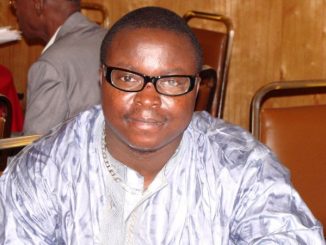
Courtesy Guardian newspaper of UK
For more than a year and a half, three of the world’s poorest countries have struggled against the most devastating Ebola epidemic in human history. Containing this unprecedented outbreak would have been a huge challenge for Guinea, Liberia and Sierra Leone under any conditions. But the scale of the task was far greater because of the absence of the most effective possible defence: a vaccine.
That may all be about to change. I normally like to avoid superlatives when describing the interim results of a medical trial, but it is difficult to talk about the report of the experimental Ebola vaccine in the Lancet as being anything less than spectacular. More than 7,600 people in Guinea have received the vaccine, known as rVSV-ZEBOV, in a study that targeted people from communities with cases of Ebola. None who received it immediately has so far contracted the virus. That’s an efficacy of 100%. And not only has it been shown to be so effective, it has also been well tolerated, with few side effects. This is rare for vaccines such as this one that contain a live virus, and it’s something to be thankful for.
It is in fact incredibly unusual for any vaccine to show such efficacy, and so swiftly, too. For comparison, not long ago the results of trials for new malaria and dengue fever vaccines showed just how challenging development is. While they were promising, their effectiveness was much more limited.
These Ebola results mean it is much more likely that we can fight back against future outbreaks. The procedure would be to vaccinate in a ring around known cases. That way, further infections can be prevented. In fact, this strategy should now play an important role in bringing the present epidemic to an earlier conclusion than we all believed possible.
That the end might come in this way is much more than I dared to hope for a year ago, when the Wellcome Trust began its support for this research. At that time, it was doubtful whether the will existed to test vaccines at all. But, to their eternal credit, a global partnership of researchers, governments, NGOs, companies and funders managed to accomplish something that too many have for too long filed in the drawer marked “too difficult”: conducting a trial in the midst of an epidemic.
Epidemics strike quickly; vaccine studies generally take years, not least because of the safety and ethical issues involved when healthy people are immunised. The regulatory systems quite properly built to protect people in normal times are not suited to the speed with which research must respond to an outbreak. Yet where epidemic diseases such as Ebola are concerned, there is, in fact, no other way of testing effectiveness. It’s got to be done as an epidemic is under way. As I and others argued a year ago, we had to find a way, no matter how large the obstacles.
We urgently need a global vaccine development fund, with contributions from governments, foundations and industry
The answer was to innovate with a pragmatic trial design. A traditional trial with a placebo control would have been contentious and politically unacceptable, given the known mortality of Ebola and the lack of other options for prevention or treatment. To substitute a potentially life-saving vaccine for an inert substance, given the circumstances, would not have been ethical – but a comparison still needed to be made. So half of the volunteer participants were vaccinated immediately, and the other half after a three-week delay. None of those vaccinated immediately were infected, compared with 16 out of more than 2,000 in the delayed group. Importantly, there is evidence that not only are those who receive the vaccine protected, but that by interrupting transmission, others in the community are protected too. This could prove crucial to ending the epidemic.
Now that the data shows clear evidence the vaccine is working, the trial will continue, and all participants will receive the vaccine immediately. The inclusion criteria will be widened, and the study could potentially be extended from Guinea to Sierra Leone and Liberia. We must continue to gather data on safety and efficacy, so that the vaccine can be licensed and rolled out as a public health measure. But the promise is clear and exciting.
The lesson we must learn from this episode is also clear. Once we successfully made the case for vaccine trials last summer, the medical research community moved with astonishing speed to put studies of rVSV-ZEBOV and other candidates into the field; at the Wellcome Trust, we fast-tracked over £10m in grants in weeks. But for the 11,000 and counting killed by the epidemic, unprecedented speed was not fast enough. The vaccine could and should have begun testing much more quickly. rVSV-ZEBOV was developed five years ago in Canada, but it sat on the shelf, untested in humans. Safety trials in people were not started until autumn 2014, and the trial in Guinea did not begin until March 2015, a year after the outbreak was recognised.
Child holding up a sign saying thank you for the Ebola vaccine
Six-year-old Cecilia Kamara from Robertsport, Liberia holds up a sign after receiving news about the Ebola vaccine. Photograph: Alphanso Appleton
This must not happen again. We cannot ultimately test the effectiveness of vaccines against epidemic diseases until there is an epidemic, but that can be no excuse for inertia. It is clear to me that what we urgently need now is a global vaccine development fund, with contributions from governments, philanthropic foundations and industry.
This would support work to ensure that candidate vaccines go through every step of testing, except the final one, before a crisis occurs. It would also help ensure that contracts for production and delivery were in place, along with insurance and indemnity, and that ethical and regulatory protocols for trials had been agreed in advance. Then, when an outbreak does occur, the candidate vaccines can begin coordinated trials within days. This state of enhanced readiness to fight back against a deadly disease would almost certainly save lives.
We can’t prepare for new infections we know nothing about – no one could have predicted HIV, for example. But there are many known pathogens that could cause serious outbreaks in humans: chikungunya, Mers and Sars to name but a few. We must agree on a list of those with known potential to cause disasters and, for each, have experimental vaccines that have completed safety tests in healthy volunteers so they can be deployed without delay in an emergency.
These Ebola vaccine results are a huge achievement, showing that it is possible to test experimental vaccines in the context of an epidemic, under the most difficult conditions. They demonstrate the power of equitable international partnerships and flexibility, and should change how the world responds to emerging health threats in future. It is only a matter of time before another outbreak of a known infectious disease for which we have no vaccine. It could be a deadlier one than Ebola.



